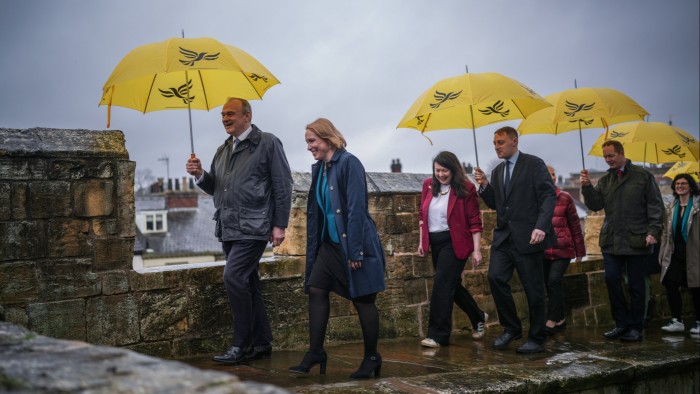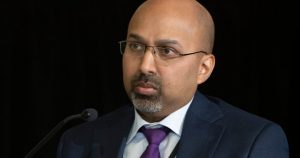Liberal Democrats hope party’s rising talent will cement gains

This article is an on-site version of our Inside Politics newsletter. Subscribers can sign up here to get the newsletter delivered every weekday. If you’re not a subscriber, you can still receive the newsletter free for 30 days
Good morning. One of the most common topics of our reader questions is the Liberal Democrats, and in particular “who are the rising stars?” More on that in today’s newsletter.
Inside Politics is edited by Georgina Quach. Read the previous edition of the newsletter here. Please send gossip, thoughts and feedback to [email protected]
They were all yellow
In some ways, the answer is “well, it depends on how you define ‘rising stars’”.
There are MPs such as Lisa Smart (now home affairs spokesperson, newly elected for Hazel Grove) who have long been big wheels in the party machine and its campaign apparatus. There are MPs such as Cameron Thomas, who this time last year was still a commissioned officer in the Royal Air Force, and whose remarkable effort in winning the Tewkesbury seat in July has made everyone in the party sit up and take notice. There are MPs such as Calum Miller, former senior civil servant and now the Lib Dem foreign affairs spokesperson. Given the Liberal Democrats will set out a distinctly anti-Trump position than the government will feel pragmatism can allow, Miller, and others like him, will surely become significant voices in this parliament.
Then there are MPs in positions where the government may get into trouble but the Conservatives are poorly placed to take advantage of it: at the moment, the MP who leaps out is Max Wilkinson, the party’s spokesperson for culture, media and sport. Labour’s spending plans include a reduction in day-to-day spending in the DCMS budget, and it seems unlikely that the current Conservative Party will want to prioritise reversing or opposing such a move. That will surely be the source of political rows, but there will be others.
Then there are MPs elected in previous intakes, such as Daisy Cooper or Munira Wilson or Wendy Chamberlain who are talked of as possible leadership contenders. But for today I want to focus on an MP that the party leadership hopes will be the model that the new intake follow: Helen Morgan, the MP for North Shropshire.
One feature of what was a remarkable election night for the Lib Dems is that they held all of the seats they captured from the Conservatives in by-elections. Usually, even on very good nights for the party, some of the seats they win in by-elections prove to be impossible to defend on a general election turnout.
When the party won the North Shropshire seat back in December 2021, very few Lib Dems thought they could retain it at a general election. Morgan worked the seat industriously, to the point that it went from a seat that the party had written off holding in 2021 to one it had no fear of losing by 2024.
Digging in locally and building up your own base is what the party leadership will hope the new MPs focus on and achieve. (Tim Farron is another example in the Westmorland and Lonsdale constituency. He succeeded in squeezing down the Labour vote to the level it was only 5.4 per cent in 2015, a horror year for the party nationally. But I felt it was a stretch to use a former leader as a peg for this point given the question at hand.)
If the new MPs can do that, of course, they will significantly boost their own party. Plus, a well-established Lib Dem presence in some of the Conservative party’s formerly very safe seats, with a much more coherent socio-economic base of support than the one they had in the 2000s, could reshape UK politics in a way that previous Lib Dem rising stars only ever dreamt of.
Now try this
I am very much enjoying James Belich’s The World The Plague Made, a fascinating history of the Black Death that argues that the plague is an essential part of understanding the Great Divergence — in which the western world pulled ahead economically and technologically of societies it had previously been equal or outmatched by. Despite having to explain a number of knotty topics, ranging from disease to labour markets to wars, it does so lucidly and engagingly.
The Global Boardroom, the FT’s three-day digital conference, is back on December 4-6. Sign up here for free to watch 100 leaders from business, government, and academia joining FT journalists in a round of terrific panel talks and interviews. I’ll be sitting down with Political Fix regulars Peter Foster, Miranda Green and Lucy Fisher on the event’s second day to discuss Labour’s first five months in office.
Top stories today
-
An awkward combination | The UK government is undermining its drive to bring benefits claimants into work by rushing in reforms to workers’ rights that will make it riskier to take a chance on new hires, business groups have warned.
-
You auto know by now | Stellantis blamed the UK’s electric vehicle sales rules as it announced plans to shut its van factory in Luton, putting about 1,100 jobs at risk.
-
‘Keir needs to be decisive’ | On the back of Starmer’s collapsing approval ratings and an online parliamentary petition demanding a new general election, allies of the prime minister say he needs to raise his game. One senior Labour official told the FT the party was ill-prepared for power: “There was nothing there: no plan, no personnel.”
-
Drastic effects | Ministers’ refusal to fund significantly more criminal court sitting days has exacerbated pressure on the justice system, England’s most senior judge warned.
Recommended newsletters for you
White House Watch — Your essential guide to what the 2024 election means for Washington and the world. Sign up here
One Must-Read — Remarkable journalism you won’t want to miss. Sign up here
#Liberal #Democrats #hope #partys #rising #talent #cement #gains






